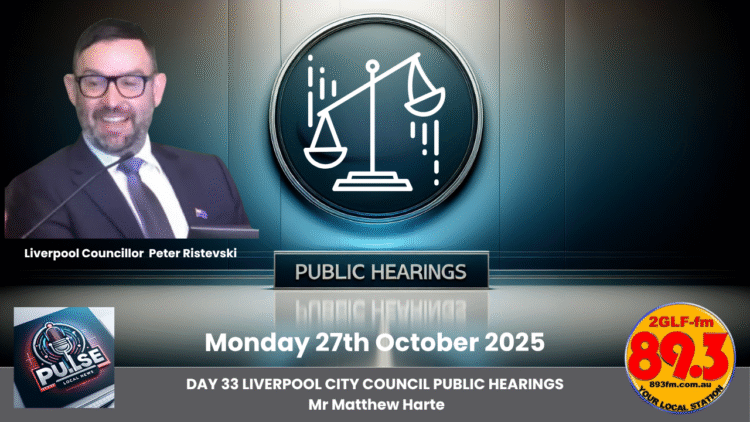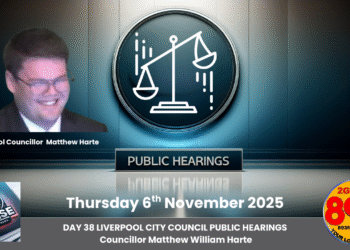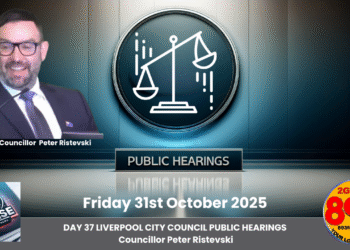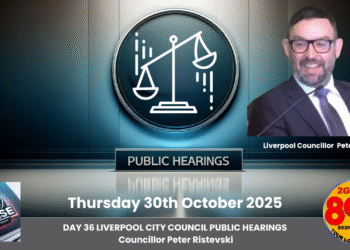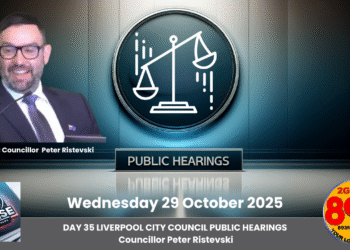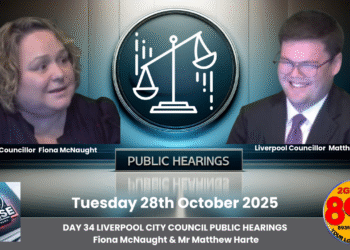Summary of Proceedings
Councillor Peter Ristevski’s Testimony
- Background and Political History: Councillor Peter Ristevski, sworn in as a witness, confirmed his dual role as an accountant with over 30 years of experience (running his own firm) and a current councillor at Liverpool City Council. He previously served from 2012 to 2016 as a Liberal Party-affiliated councillor, having been a member for about 10 years prior to 2012 through the Moorebank branch. He left the Liberal Party in early 2021 before the December 2021 election, in which he did not stand.
- Recent Election and Affiliation: Ristevski was elected in September 2024 as an independent councillor for the South Ward, also running for mayor, under the banner of “Our Local Community,” a registered group for Local Government elections operating across multiple council areas (e.g., Cumberland, Canada Bay). His ticket included 10 candidates for Liverpool.
- Relationship with Mayor Ned Mannoun: Ristevski first met Mannoun in 2008 at a Liberal Party event, leading to his inclusion on a 2008 election ticket (unsuccessful) and providing accounting services to Mannoun from 2008 to 2015. Disagreements emerged in 2015 during his 2012-2016 term, causing him to vote more often with Labor and other independents despite remaining a Liberal member. A notable 3 February 2016 council meeting incident saw Ristevski expelled by Mannoun after a contentious debate over a rescission motion on outsourcing cleaning services, reflecting a loss of confidence in the mayor.
- Ongoing Tensions: Post-2016, tensions persisted with Mannoun, including public allegations in the press and defamation proceedings initiated by Mannoun in August 2023, resolved in Ristevski’s favor in September 2024. Ristevski described his current relationship with Mannoun as lacking trust due to leadership disagreements, denying personal hatred but acknowledging “vigorous debate” and passionate arguments, which he sees as professional rather than antagonistic.
- Views on Debate and Boundaries: Ristevski emphasized vigorous debate as central to his role, focusing on merits of proposals (e.g., financial responsibility, public benefit) within council, governed by the Code of Meeting Practice. He noted boundaries like avoiding family references apply across venues, with the Code of Conduct extending to external settings like social media. However, he felt Local Government restrictions are overly stringent compared to state or federal levels, limiting debate.
- Social Media and Training: Ristevski maintains a Councillor Peter Ristevski Facebook page and engages in local community pages, viewing social media as a platform for continuing vigorous debate. He initially believed there were no boundaries due to lack of training in 2012-2016 and post-2024 election (induction training lacked social media focus and offered minimal code of conduct guidance). He has since adapted his style following code of conduct complaints, self-auditing to comply with what he sees as restrictive laws.
- Training Deficiencies: Ristevski criticized the 2024 induction training as inadequate, describing it as a “propaganda exercise” dominated by directors’ presentations rather than practical guidance on the Code of Meeting Practice, code of conduct, social media, or drafting notices of motion, which he believes are essential for effective councillor performance.
Matters Arising of Interest to Ratepayers: Are Ratepayers Getting Good Value for Money?
Ratepayers of Liverpool City Council are concerned about whether their contributions result in effective governance and representation. The following matters from Day 33 of the inquiry highlight areas where value for money is in question:
- Governance and Internal Conflict:
- Tension with Mayor Mannoun: Councillor Ristevski’s long-standing disagreements with Mayor Mannoun, evidenced by public disputes, defamation proceedings, and a 2016 expulsion from a meeting, suggest deep-seated conflict that could hinder collaborative decision-making. Ratepayers may question if their money funds a council plagued by personal or professional antagonism, diverting focus from community priorities to internal disputes.
- Impact of Vigorous Debate: While Ristevski frames his interactions as “vigorous debate” essential to democratic process, the intensity—leading to expulsions and public spats—may contribute to dysfunction. If debates escalate beyond policy merits to personal clashes, ratepayers may not receive value as council efficiency and unity suffer, potentially delaying or derailing beneficial initiatives.
- Training and Preparedness of Councillors:
- Inadequate Training: Ristevski’s critique of induction training as lacking substance on critical areas like the Code of Meeting Practice, code of conduct, and social media usage raises concerns about councillor preparedness. If ratepayer-funded training fails to equip councillors with necessary skills to navigate governance rules or public communication, the quality of representation diminishes, questioning the value of resources spent on such programs.
- Social Media Conduct Risks: Ristevski’s initial unawareness of social media boundaries, only adjusted after code of conduct complaints, indicates potential for missteps that could damage council reputation or trigger costly disputes. Ratepayers may wonder if their money supports a council prone to avoidable controversies due to inadequate guidance, rather than focused public engagement.
- Representation and Political Dynamics:
- Shift in Political Alignment: Ristevski’s transition from Liberal affiliation to independent status with “Our Local Community,” coupled with voting against party lines post-2015 disagreement, suggests fluidity in allegiance that may confuse or alienate ratepayers expecting consistent representation. If political shifts or personal conflicts influence voting over community needs, ratepayers may not receive the value of aligned, predictable advocacy.
- Public Perception and Trust: Ristevski’s acknowledgment that his debates with Mannoun might “look” personal, despite denying hatred, could erode public trust in council harmony. If ratepayers perceive governance as driven by discord rather than cooperation, they may question whether their contributions fund a cohesive body capable of delivering effective outcomes.
Conclusion
The Day 33 proceedings of the Public Inquiry into Liverpool City Council reveal significant challenges in governance dynamics, councillor preparedness, and public representation that affect whether ratepayers are receiving good value for their money. Persistent tensions between Councillor Ristevski and Mayor Mannoun, coupled with the potential for vigorous debate to disrupt council efficiency, suggest internal conflicts may detract from community-focused decision-making. Additionally, inadequate training on essential governance and social media practices risks councillor missteps, further straining resources. Ratepayers deserve assurance that their contributions support a unified, well-equipped council prioritizing local needs over personal or political disputes, yet evidence from this hearing indicates areas where value for money remains uncertain. As the inquiry continues, these issues warrant scrutiny to ensure improvements at Liverpool City Council









